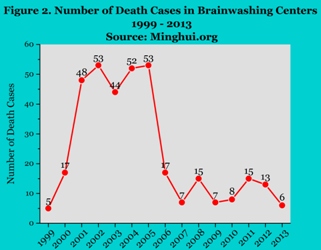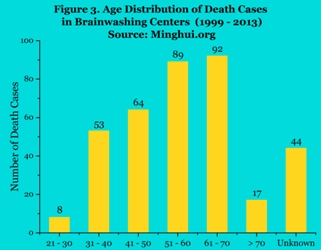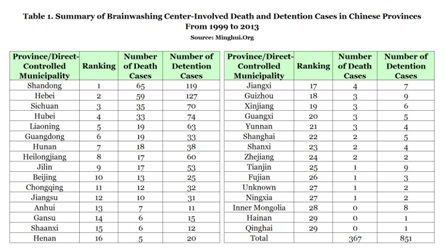Summary Report: The Role of China's Brainwashing Centers in the Torture Deaths of Falun Gong Practitioners
(Minghui.org) In the persecution of Falun Gong, the Chinese Communist Party (CCP) has utilized multiple facilities to detain and torture thousands upon thousands of law-abiding citizens. Besides the more commonly known prisons, detention centers, and labor camps, there exists a lesser known facility that has played a major role in persecuting Falun Gong. Often referred to as “law education centers” by Chinese authorities, these set-ups are more accurately known as brainwashing centers.
Serving as extrajudicial prisons, the brainwashing centers detain Falun Gong practitioners for as long as they so choose. The sole purpose of the brainwashing center is to force Falun Gong practitioners to renounce their belief. To achieve this, the centers force practitioners to constantly watch or listen to propaganda videos or recordings that slander Falun Gong, and often physically torture them, which has led to hundreds of confirmed deaths.
To date, in the persecution of Falun Gong, 3,653 death cases have been reported, with the identities and details confirmed. Seven hundred and forty-six (11%) out of the total had experienced detention in brainwashing centers, of which 357 deaths occurred in the centers. These death and detention cases involve 173 cities, 329 counties, and 449 brainwashing centers in China. This report presents the results of an investigation into the correlation between the death cases on record and brainwashing centers.
1. Overview of the history of brainwashing centers
The first death case in a brainwashing center happened in January 2000, soon after the CCP launched the persecution of Falun Gong. A local retired worker, Chen Zixiu, from Weifang City, Shandong Province was arrested and jailed in a brainwashing center on February 17, because she had gone to Beijing to appeal for Falun Gong. On the morning of February 21, she was beaten to death.
On April 20, 2000, The Wall Street Journal published an article titled “Practicing Falun Gong Was a Right, Ms. Chen Said, up to Her Last Day” by Ian Johnson, a staff reporter. Johnson won the 2001 Pulitzer Prize for this article.
After the news was exposed, the CCP regime didn't bring the murderers of Chen Zixiu to justice, but instead arrested Chen's daughter, Zhang Xueling for leaking the information to the American journalist. Zhang Xueling was sentenced to three years of labor camp with the charge of “harming the public security.”
In August 2001, John Pomfret and Philip Pan from The Washington Post, reported that to destroy Falun Gong the Chinese regime took an approach with three ingredients, namely, violence, a high-pressure propaganda campaign, and brainwashing centers.
According to the article, “Some local governments had experimented with brainwashing classes before, but in January, Beijing's secret 610 office, an interagency task force leading the charge against Falun Gong, ordered all neighborhood committees, state institutions and companies to begin using them, government sources said. No Falun Gong member is supposed to be spared.”
While brainwashing centers are officially called “law education centers,” “legal training bases,” or “thought transformation schools,” they have nothing to do with the law, education, or schooling.
Law enforcement does not need to file any legal document or go through any legal processes to send a Falun Gong practitioner to brainwashing centers. The workers at the centers are told that they bear no responsibility for the outcome of torturing Falun Gong practitioners, even if the torture leads to death.
In 2004, the World Organization to Investigate the Persecution of Falun Gong (WOIPFG) published the “Investigative Report on Brainwashing Classes and Brainwashing Methods.” According to the report, physical torture and drugs that damage the nervous system are two commonly used methods in the brainwashing centers.
In early 2013, the CCP announced a plan to abolish the notorious forced labor camp system, which had been a major apparatus in the persecution of Falun Gong. Brainwashing centers since have taken over part of the role of forced labor camps.
According to a report published on the Minghui website in January 2014, “As forced labor camps were shut down, the number of Falun Gong practitioners jailed in brainwashing centers dramatically increased. From January to June 2013, 181 such cases were reported. However, in the second half of the year, as the labor camp system started to phase out, the number jumped to 1,044.” (http://en.minghui.org/html/articles/2014/1/18/144478.html)
Many Falun Gong practitioners who were jailed in forced labor camps were not freed after the forced labor camp system was abolished. They were directly transferred to brainwashing centers.
Another article on Minghui.org reported that, in the year of 2013, the CCP set up 157 brainwashing centers in 27 provinces, and 737 practitioners were sent to these centers.
2. Detailed analysis of death and detention cases in brainwashing centers
According to statistics published on the Minghui website in December, 2013, out of 3,653 confirmed death cases of Falun Gong practitioners over the past 15-year persecution, 746 (11%) had experienced torture in brainwashing centers; some of whom had been jailed more than once, making the total number of detentions 851. Three hundred and sixty-five out of 3653 deaths took place in the brainwashing centers. Two deaths that took place in a brainwashing center were reported recently, making the total number 367.
The investigation showed that the most common cause of death in the brainwashing center has been forced injection of nerve-damaging drugs, which made up 32% of the death cases. The second highest cause of death was beating (20%). 19% of the death cases were caused by the use of multiple tortures.
An internal government document, which gives instructions and protocols for brainwashing centers, states explicitly: “To transform Falun Gong practitioners, when necessary, the officials can take medical and clinical approaches.” This policy has led to the abuse of nerve-damaging drugs.
Below we give more detailed analysis of the brainwashing-center-involved death cases and detention cases.
Note: The analysis is based on data from the 3,653 confirmed death cases in the persecution. Not all of these deaths involved brainwashing centers. The reason we use this dataset is because the information on these death cases are available in detail. Many more practitioners have been jailed in brainwashing centers, but managed to survive. Those cases, as well as unreported or unconfirmed deaths, are excluded from the analysis.
Figure 1 shows that the brainwashing center has played a major role in the persecution since the very beginning. In 1999, 107 practitioners were jailed in brainwashing centers, among which 58 occurred in July, the month that the CCP launched the persecution. Of the 3,653 death cases, the number of detentions in brainwashing centers increased to 146 in 2000, and reached the highest—188 in 2001.
On July 21, 1999, the second day after the CCP announced the suppression of Falun Gong, the director of the Political and Legal Affairs Committee of the CCP in Zhushan town, Yilan County, Heilongjiang Province, Li Chuanfu set up a temporary brainwashing center. Li jailed all the local practitioners, and tried to force them to quit practicing using violence. On September 29, Zhao Chunxi (male), a local practitioner, died due to the torture.
The number of death cases in the brainwashing center increased from 5 in 1999 to 17 the following year, and was steadily high at around 50 every year from 2001-2005. Seventy percent of the deaths in brainwashing centers (250 cases) occurred during these five years (Fig. 2).
Among 367 practitioners tortured to death in the brainwashing centers, 62% were female, 35% were male, and the gender of the rest is unknown.
Figure 3 shows the age distribution of the death cases. The age interval with the highest number of deaths was between 61 to 70, which included 92 death cases.
The persecution of Falun Gong practitioners in brainwashing centers have occurred in almost every province in China, except Tibet. Table 1 shows the number of death and detention cases in each province. Shandong Province has had the most brainwashing center-caused death cases (65 cases). Hebei (59 cases) and Sichuan (35 cases) rank second and third.
Note: The ranking is based on the number of death cases. The number of detention cases is factored in when two provinces have the same number of death cases. The same method was applied for making Tables 2 and 3.
Table 2 shows the number of brainwashing center-caused death cases in major Chinese cities, including the four direct-controlled municipalities, namely, Beijing, Tianjin, Shanghai, and Chongqing. Yantai City in Shandong Province ranks the first with 21 cases, followed by Weifang City in Shandong Province (20 cases) and Chengdu in Sichuan Province (19 cases).
Among 367 death and 851 detention cases, the names of the involved brainwashing centers were reported in 281 death and 652 detention cases. Table 3 lists the top 15 centers in terms of deaths and detentions.







